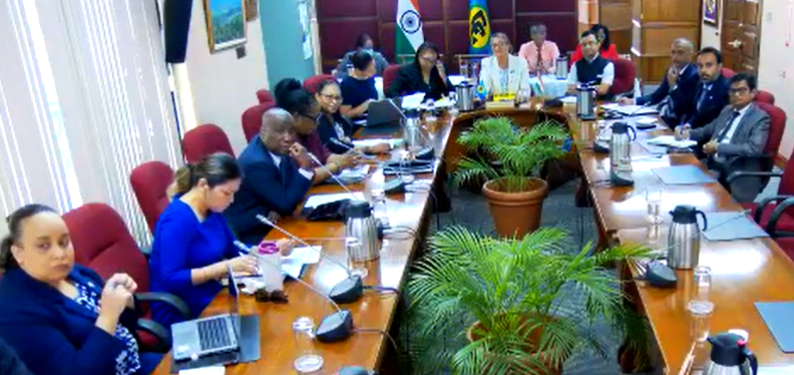Context:
Recently, the second meeting of the India-CARICOM Joint Commission was concluded virtually.
Some key outcomes of the meeting:
- Partnership Review: The commission conducted a comprehensive review of crucial sectors including economic cooperation, agriculture, healthcare, pharmaceuticals, energy infrastructure, and technology innovation.
- Economic Cooperation: Both parties focused on strengthening economic ties and enhancing trade relations, emphasizing the development of robust partnerships across multiple sectors.
- Development Initiatives: Discussions centred on advancing cooperation in digital public infrastructure, education, and development programs to foster stronger bilateral relations.
- Climate Action: The meeting addressed critical environmental concerns, focusing on climate change adaptation, disaster management strategies, and the development of resilient infrastructure systems.
CARICOM (Caribbean Community and Common Market) (Caribbean Community)

- CARICOM came into being on 4th July 1973 with the signing of the Treaty of Chaguaramas by Prime Ministers of Barbados, Guyana, Jamaica and Trinidad and Tobago.
- The Caribbean Community (CARICOM) is a group of twenty-one countries: fifteen Member States and six Associate Members. All CARICOM countries are classified as developing countries.
- 15 member states: Antigua and Barbuda, Bahamas, Barbados, Belize, Dominica, Grenada, Guyana, Haiti, Jamaica, Monsterrat, St. Kitts and Nevis, Saint Lucia, St. Vincent and the Grenadines, Suriname and Trinidad & Tobago.
- 6 Associate Members: Anguilla, Bermuda, British Virgin Islands, Cayman Islands, Curacao and Turks & Caicos Islands.
- All members subscribe to the Community’s principles outlined in the Revised Treaty of Chaguaramas (2002).
The Principal Organs of the Community
- The Conference of Heads of Government (The Conference)
- The Community Council of Ministers (The Council) are assisted by five Organs, three “Bodies”
- The CARICOM Secretariat.
Significance of CARICOM for India
CARICOM is a key Partner for India. Both India and CARICOM share common goals of tackling issues like climate change, sustainable development, and regional security.
India’s International Solar Alliance (ISA) and the Coalition for Disaster Resilient Infrastructure (CDRI) are frameworks through which India aims to collaborate with CARICOM countries on renewable energy solutions and disaster resilience.
- In 2019, India had already extended a $140 million line of credit to CARICOM for solar energy projects.
Security: India offers valuable support to CARICOM countries in strengthening their defence and security infrastructure.
Economic Engagement: India is well aligned with the needs of many CARICOM nations, which are seeking to modernize their economies and improve the living standards of their citizens.
International Partnerships
- European Cooperation: Through CARIFORUM, CARICOM maintains strong economic ties with the European Union, facilitating trade and investment opportunities.
- Cuban Relations: The organization has strengthened ties with Cuba through the CARICOM-Cuba Trade and Economic Cooperation Agreement, enhancing regional cooperation.
- Global Engagement: CARICOM actively participates in international forums and maintains diplomatic relations with major global powers, including India, as evidenced by the recent Joint Commission meeting.

